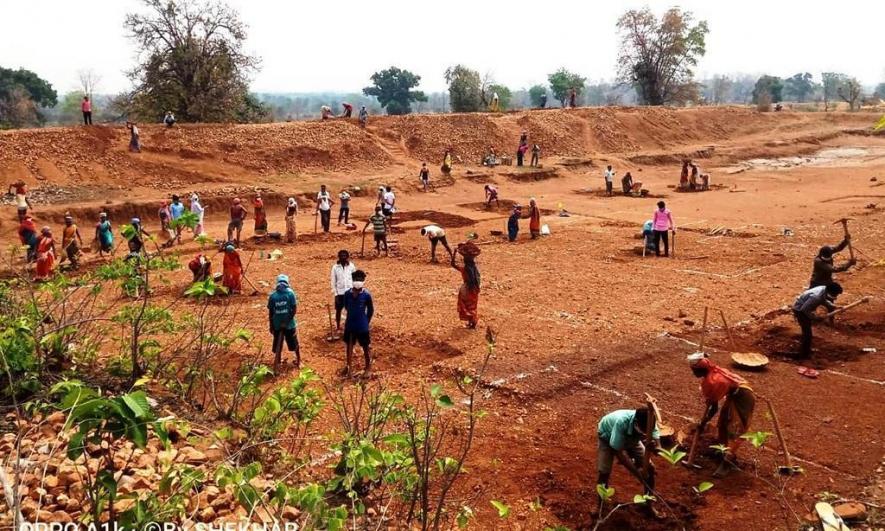Activists Slam Directive Mandating App-Based Attendance For All NREGA Workers

ON December 23, the Union Ministry of Rural Development, Mahatma Gandhi National Rural Employment Guarantee Act (‘NREGA’) division issued a directive mandating the capturing of attendance at the worksite through a mobile application, the National Mobile Monitoring System App (‘NMMS’), from January 1, 2023. The App necessitates two time-stamped and geotagged photographs of workers in a day.
As per the NREGA of 2005,100 days of wage employment is guaranteed to every rural household whose adult members volunteer to do unskilled manual work, and workers are promised wages within 15 days from the date on which the wages become due for payment. NREGA was passed with the goal to provide social protection to the vulnerable in rural areas by guaranteeing employment opportunities and due wages.
The applicability of an app-based attendance system started in May 2021. Further, from May 2022, manual attendance was discontinued and the applicability of NMMS was mandated for worksites with 20 or more workers. With the latest directive, the capturing of attendance through the mobile app is made mandatory for all workers, except those working on Individual Beneficiary Schemes/Projects.
On the need for an app-based attendance mandate, the directive states that NMMS allows real-time attendance of workers at NREGA worksites, transparency in the implementation of the Mahatma Gandhi National Rural Employment Guarantee Scheme, increase in citizen oversight of the programme, and ease of governance.
Nikhil Dey, founding member of the workers and farmers solidarity group Mazdoor Kisan Shakti Sangathan, and of the National Campaign For People’s Right to Information, a network of right to information activist organisations and individuals, shared his views on the mandate with The Leaflet, and said, “The whole mandate is completely flawed and unjustified.”
Explaining the flaws in the implementation of the mandate, Dey said that firstly, NREGA workers are paid as per output. Since the payment of wages depends on workers’ output and not attendance, the mandate does not serve any purpose.
Secondly, according to Dey, the functioning of NMMS that requires photographs is flawed since a single group of five people can click multiple photographs and show themselves to be a larger group, or women can bring down their ghunghat or veils. There has not been a single case of anyone who has examined the photographs, Dey added. Thus, he opined that the NMMS system works counter-productive to the goal of controlling corruption by giving a stamp of approval to people who can misuse the system.
Thirdly, immense problems are faced by the genuine labourers who do come to work, including connectivity issues and the need for a mobile phone that supports NMMS, Dey emphasised. “On all counts, the system (NMMS) is a poor policy measure, which is vindictive or designed for people to lose faith in it”, Dey added.
On the Ministry’s reasoning of transparency, accountability and promotion of citizen oversight by digitising attendance, Dey said it is clearly a misuse of these terms since the mandate is widely criticised for severely lacking transparency and accountability by mandating photographs. Dey opined, “It does not promote citizen oversight but bureaucratic oversight”.
Delving on the need of the hour to ensure the smooth functioning of NREGA, Dey said that, firstly, the government should prioritise the use of its own available supervisory machinery. He explained, “An entire supervisory and monitoring mechanism is in place, from paid supervisors in villages and worksites to those who are junior technical assistants and the engineers, whose job is to measure work.”
Dey emphasised that, secondly, to encourage citizen monitoring, the government must conduct concurrent and public audits, ensure that the muster rolls are in sight, and make the payment of wages openly. Dey pointed out that by cutting down the funding of the social audit units, the government fails to support citizen monitoring.
Thirdly, according to Dey, the Union Government must take action, not by cutting the funding to the states, but by taking action against the officials that are found guilty of corruption.
Get the latest reports & analysis with people's perspective on Protests, movements & deep analytical videos, discussions of the current affairs in your Telegram app. Subscribe to NewsClick's Telegram channel & get Real-Time updates on stories, as they get published on our website.
























